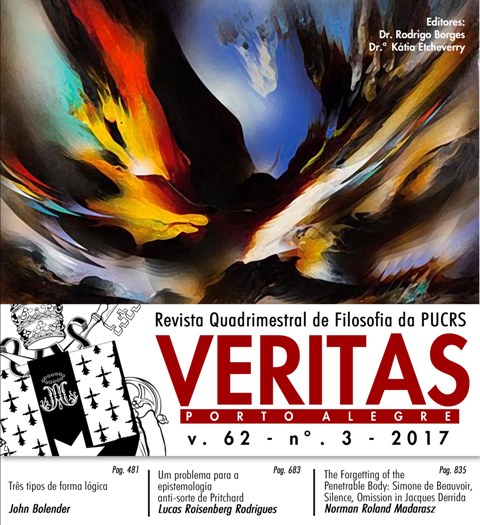Revisiting knowledge from Falsehood
DOI:
https://doi.org/10.15448/1984-6746.2017.3.28610Keywords:
Knowledge. Reasoning. Falsehood. Inference.Abstract
The knowledge from falsehood (KFF) advocates present us with putative examples of inferential knowledge in which a subject S apparently acquires knowledge by competently inferring it from a falsehood. If they are right, then we will have to face some major problems for the epistemology of reasoning. However, in this paper, I will argue that there is no knowledge from falsehood (KFF), that the cases presented by KFF advocates are not cases of genuine inferential knowledge at all, and that the intuitive reaction to attribute knowledge to the subject in such cases has no relation with the falsehood. My opposition to KFF will be directed to the KFF account put forward by Peter Klein in his paper “Useful False Beliefs” (2008). In particular, I show that Klein’s account fails because (i) it is unable to describe how the falsehood can inferentially provide a positive epistemic status to the inferred belief in order to upgrade it to knowledge; and (ii) it is incompatible with a tacit and widespread notion of inference.Downloads
References
BOGHOSSIAN, P. What is Inference? Philosophical Studies, 169, pp.1-18. 2012. DOI: https://doi.org/10.1007/s11098-012-9903-x
DE ALMEIDA, C. Epistemic Closure, Skepticism and Defeasibility. Synthese 188: 197-215. 2011. DOI: https://doi.org/10.1007/s11229-011-9923-7
DE ALMEIDA, C. Knowledge, Benign Falsehoods, and the Gettier Problem. In: Borges, R., de Almeida. C., Klein, P., (eds.). Explaining Knowledge: New Essays on the Gettier Problem, Oxford: OUP. (Forthcoming)
FITELSON, B. Strengthening the Case for Knowledge from Falsehood. Analysis, v.70(4).(2010). DOI: https://doi.org/10.1093/analys/anq078
FLORIDI. L. The Logic of Being Informed. Logique et Analyse, v. 49, nº 196, pp. 433-460. (2006). DOI: https://doi.org/10.2139/ssrn.3845217
GOLDMAN, A. A Causal Theory of Knowing. Journal of Philosophy, 64:12. (1967). DOI: https://doi.org/10.2307/2024268
HILPINEN, R. Knowledge and Conditionals. Tomberlin, J. (Ed.). Philosophical Perspectives 2, Epistemology (157-82). Atascadero, CA: Ridgeview. 1988. DOI: https://doi.org/10.2307/2214073
KLEIN, P. Warrant, Proper Function, Reliabilism, and Defeasibility. In: J. Kvanvig (ed.), Warrant in Contemporary Epistemology, pp. 97–130. Lanham, MD: Rowman and Little eld. 1996.
KLEIN, P. Useful False Beliefs. Quentin, S. (Ed.). Epistemology: New Essays (25-61). Oxford, UK: Oxford University Press. 2008. DOI: https://doi.org/10.1093/acprof:oso/9780199264933.003.0003
LEHRER, K. Theory of Knowledge. Boulder, CO: Westview Press. 1990.
LUZZI, F. ‘Counter-Closure.’ Australasian Journal of Philosophy, 88: 673–83. 2010. DOI: https://doi.org/10.1080/00048400903341770
NETA, R. What is an Inference? Philosophical issues, 23,. 2013. DOI: https://doi.org/10.1111/phis.12020
RIZZIERI, A. ‘Evidence Does Not Equal Knowledge.’ Philosophical Studies, 153: 235–42. 2011. DOI: https://doi.org/10.1007/s11098-009-9488-1
SCHNEE, I. There is no Knowledge from Falsehhod. Episteme, v.12, pp. 53-74. 2015. DOI: https://doi.org/10.1017/epi.2014.26
SCHWITZGEBEL, E. ‘Belief.’ In E. N. Zalta (ed.), Stanford Encyclopedia of Philosophy, http://plato.stanford.edu/archives/win2011/entries/belief/. 2011.
WARFIELD, T. ‘Knowledge from Falsehood.’ Philosophical Perspectives, 19: 405–16. 2005. DOI: https://doi.org/10.1111/j.1520-8583.2005.00067.x
Downloads
Published
How to Cite
Issue
Section
License
Copyright
The submission of originals to Revista Veritas implies the transfer by the authors of the right for publication. Authors retain copyright and grant the journal right of first publication. If the authors wish to include the same data into another publication, they must cite Revista Veritas as the site of original publication.
Creative Commons License
Except where otherwise specified, material published in this journal is licensed under a Creative Commons Attribution 4.0 International license, which allows unrestricted use, distribution and reproduction in any medium, provided the original publication is correctly cited. Copyright: © 2006-2020 EDIPUCRS</p






